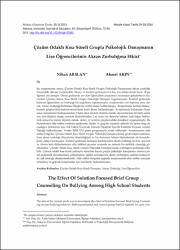Çözüm Odaklı Kısa Süreli Grupla Psikolojik Danışmanın Lise Öğrencilerinin Akran Zorbalığına Etkisi
Künye
ARSLAN, Nihan & Ahmet AKIN. "Çözüm Odaklı Kısa Süreli Grupla Psikolojik Danışmanın Lise Öğrencilerinin Akran Zorbalığına Etkisi". Sakarya University Journal of Education, 6.1 (2016): 72-84.Özet
Bu araştırmanın amacı, Çözüm Odaklı Kısa Süreli Grupla Psikolojik Danışmanın akran zorbalığı
üzerindeki etkisini incelemektir. Deney ve kontrol grubunda 6’sı kız, 6’sı erkek olmak üzere 12’şer
öğrenci yer almıştır. Deney grubunda yer alan öğrencilere araştırmacı tarafından geliştirilen 6 oturumluk
Çözüm Odaklı Kısa Süreli Grupla Psikolojik Danışma uygulanmıştır. Kontrol grubunda
bulunan öğrencilere ise herhangi bir uygulama yapılmamıştır. Araştırmada veri toplama aracı olarak;
Akran Zorbalığı Belirleme Ölçeği’nin zorba formu kullanılmıştır. Araştırmada 2x3'lük (deney/
kontrol gruplarıXön-test/son-test/izleme testi) desen kullanılmıştır. Araştırmada kullanılan ölçme
aracı oturumların başlamasından 2 hafta önce ön-test ölçümü olarak; oturumlardan iki hafta sonra
son- test ölçümü olarak; son-test ölçümlerinden 2 ay sonra ise deneysel işlemin kalıcılığını belirlemek
amacıyla izleme ölçümü olarak, deney ve kontrol gruplarındaki deneklere uygulanmıştır. Bu
ölçümlerden elde edilen verilerin analizinde, ölçüm ve gruplar arasında anlamlı bir farkın olup olmadığını
belirlemek için; Tek Faktör Üzerinde Tekrarlı Ölçümler İçin İki Faktörlü Varyans Analizi
Tekniği kullanılmıştır. Veriler SPSS 17.0 paket programıyla analiz edilmiştir. Araştırmadan elde
edilen bulgular, Çözüm Odaklı Kısa Süreli Grupla Psikolojik Danışma deney grubundaki katılımcıların
akran zorbalığı düzeylerini düşürdüğünü ve bu durumun izleme ölçümlerinde de korunduğunu
ortaya koymuştur. Kontrol grubunda bulunan katılımcıların akran zorbalığı ön-test, son-test
ve izleme testi ölçümlerinden elde ettikleri puanlar arasında ise anlamlı bir farklılık olmadığı görülmüştür.
Çözüm Odaklı Kısa Süreli Grupla Psikolojik Danışma akran zorbalığını azaltmada etkilidir.
Çözüm odaklı kısa süreli yaklaşımı temeline dayalı grupla psikolojik danışmanın alanda çalışan
psikolojik danışmanlara, psikologlara, eğitim uzmanlarına akran zorbalığını azaltma konusunda
ışık tutacağı düşünülmektedir. Elde edilen bulgular ışığında araştırmadan elde edilen sonuçlar
tartışılmış ve gelecek araştırmalar için önerilerde bulunulmuştur. The aim of the current study was to investigate the effect of Solution-Focused Brief Group Counseling
on peer bullying behavior. Both experimental and control groups had 12 students for each, con-sisting 6 females and 6 males. The experimental group took a 6-sessions Solution Focused Short-
Term Group Counseling developed by the researcher. The Peer Bullying Scale was used for collecting
data from both experimental and control groups. The 2 (experimental and control groups) X 3
(pretest, posttest, follow up) research design was applied. The dependent variable of the current
study was Peer Bullying, and the independent variable was Solution-Focused Brief Group Counseling.
The scale was administered to both experimental and control groups, as the pretest 2 weeks before
the sessions started, and as the posttest 2 weeks after the last session, and also it is used for the
follow-up test for determining the permanence of the experimental manipulation, 2 months after
the posttest. In order to determine the significant differences between the scores of the pretests, the
posttests, and the follow-up tests of both groups, two way analysis of variance (ANOVA) with repeated
measures was conducted. Data was analyzed with 17.0 SPSS program. Findings revealed
that the Solution Focused Brief Group Counseling diminished the peer bullying levels of the participants
in experimental group and the effect was maintained on the follow up measurements. On
the other hand, for the control group, there was no significant difference between participants’ Peer
Bullying Scale scores of the pretest, posttest, and follow up measurements as expected. This study
on group counseling, developed in accordance with the basic foundations of the Solution-Focused
Brief Group Counseling approach, is thought to provide insight to psychological counselors, psychologists,
educational experts working in the field. The results were discussed with within the
scope of the related literature, and suggestions were given for future studies.



















